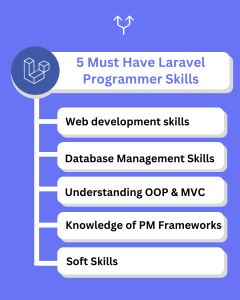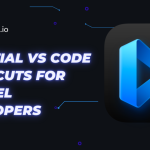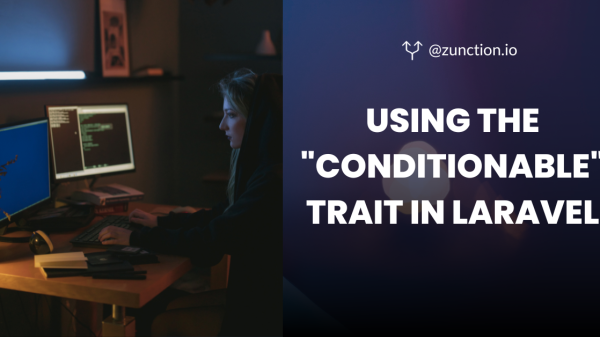If the organization wants to hire skilled and top programmers, they need to know the necessary Laravel skills. In the area related to the PHP development field, it is difficult for a hiring manager to find and recruit the right talent. You must have specific criteria and a focus on the expert of the Larevel to select the best match for your business.
Essential skills for a top-tier Laravel developer go beyond Laravel knowledge. He should also have a good command of various web technologies should know how to manage databases and should have strong knowledge of model-view-controller (MVC) and object-oriented programming (OOP).
However, the expert, in every sense of the word, should be more than just adept at programming. In order to be an efficient Laravel developer, You must have strong communication and efficient management skills as well as one has to be a good team player. For the dedicated Laravel programmers to be a part of your team, you can follow. the following steps provided by us!
Key Competencies to Seek in Skilled Laravel Developers
Then, the business must be started at the earliest. In order to select the best of the candidates, one should have a filter criterion to see if they have the type of skills required for the job.
These are the five skills every great Laravel programmer has:
- Web development skills
- Database Management Skills
- Understanding OOP & MVC
- Knowledge of Project Management Frameworks
- Soft Skills

1. Web Technologies
Fundamental web technologies should be mastered by Laravel developers:
- Hypertext Markup Language or HTML: It enables website elements like the headline, body content, and subheadings to be distinguished from one another.
- Cascading Style Sheets (CSS): By specifying how the HTML elements of a website should be shown on the front end of the page, CSS styles the content of a page.
- JavaScript: Mostly used to dynamically alter and modify the content of websites.
It is imperative for a Laravel developer to be aware of these technologies. They work directly with PHP (and thus, Laravel), so in order to do their jobs properly, developers need to be aware of how that communication works.
2. Database Management Skills
Database administration is an area of expertise for Laravel developers. They can arrange all the data from a business website, facilitating faster and more efficient data sharing among end users within the company. The most widely used database management systems are Microsoft SQL, MySQL, and Oracle 12c.
3. Object-Oriented Programming
Lavarel’s MVC architecture makes it simple to get started on projects.
Like the majority of frameworks, Laravel is constructed using object-oriented philosophy. Developers therefore need to be familiar with OOP and its ideas, which include classes, objects, methods, characteristics, etc.
4. Project Management Methodologies
The implementation of project management techniques is very useful in the field of tech. A methodology concentrating on essential tools, and needed tasks is provided to carry out a project from initiating to the end. An example of project management methodology is Worksuite
This expertise is important for the job of coding as well. If it is being worked in groups, If there is already a framework decided, hire someone with the experience to optimize the team performance through it.
5. Soft Skills
The implementation of project management techniques is very useful in the field of tech. A methodology concentrating on essential tools, and needed tasks is provided to carry out a project from beginning to end. The two project management methodologies that are widely used are agile and waterfall.
Soft skills should be highly valued and tested in interviews. You’ll want someone in your team who besides being an excellent Laravel developer also has the skills below:
- Knows how to work in a group, listens to others’ ideas, and provides their own.
- Accepts criticism and is always trying to be better
- Provides creative solutions
- Has great communication abilities
- Distributes their time efficiently and delivers tasks on time
- Is self-reliant
Here are some averages of Laravel developer salaries practised in foreign countries for comparison:
| Country | Salary per year | Salary per month | Salary per hour |
| USA | $96,071.00 | $8,006.00 | $50.00 |
| Mexico | $12,909.00 | $1,076.00 | $7.00 |
| Argentina | $9,409.00 | $784.00 | $5.00 |
| Brazil | $8,644.00 | $720.00 | $5.00 |
| Poland | $25,819.00 | $2,152.00 | $13.00 |
Source: https://distantjob.com/
How to Test Your Laravel Candidate Skills?
Finding candidates is just one step in the procedure. It requires some talent and a very comprehensive interviewing process to find the winning candidate. It’s important to assess both their hard and soft skills.
These interviews can take many forms based on what you’re attempting to examine and can be conducted virtually or in person, depending on what works best for you. The two interview formats that are most popular are:
- Technical interviews: These are standard interviews in which you prepare a list of intricate questions related to the position and utilize them to evaluate the applicant. As the name suggests, these are more appropriate for assessing candidates’ general technical knowledge but don’t reveal much about their collaborative style. For example, you should utilize this kind of interview to gauge your prospects’ proficiency with Laravel.
- Coding challenges: Pair-programming interviews and other coding challenges are more appropriate for evaluating a candidate’s soft abilities. They are designed to measure creativity and problem-solving abilities in an atmosphere that is similar to the candidate’s daily workplace, while they can also be used to evaluate technical capabilities. You should administer a customized test to your candidates that is similar to the kinds of problems they would encounter on a daily basis.
Best Questions To Ask in a Laravel Interview
Here is a sample of questions to ask your candidate for Laravel development, with increasing difficulty:
1. What Are Artisan Commands?
Laravel is packed with Artisan, a command line interface. It offers a number of commands that you can use to automate specific processes when developing Laravel apps. In order to assist you with the particular of your projects, you can also build new commands. The following are a few examples of default commands:
| Command | What It Does |
| make: controller | Creates a controller |
| make: model | Creates an Eloquent model |
| UI Bootstrap | Creates a front-end scaffolding for Bootstrap |
| UI vue | Creates a front-end scaffolding for Vue |
| UI react | Creates a front-end scaffolding for React |
| make: migration | Creates a migration |
| migrate | Executes a migration |
| route: list | Lists all routes defined by your application |
| serve | Starts the Laravel development server and provides the URL to the running Laravel application |
| down | Takes a Laravel application down for maintenance |
| up | Takes a Laravel application down for maintenance and makes it go live |
| list | Lists all available commands |
2. How Do You Generate Events And Listeners?
There are two main ways to generate Laravel events and listeners. One is doing so by hand by defining them in the App\Providers\EventServiceProvider file:
use App\Events\BookRead; use App\Listeners\SendReadNotification; protected $listen = [ BookRead::class => [ SendReadNotification::class, ], ];
However, this requires the developer to define all of these classes, which can become cumbersome as the application grows. A more convenient method is available by using Artisan. We’ll still need to define the event and listener as paths in the App\Providers\EventServiceProvider file:
protected $listen = [ 'App\Events\BookWasPurchased' => [ 'App\Listeners\EmailPurchaseConfirmation', ], ];
Then you can use Artisan to generate all the needed definitions and classes for you:
php artisan event: generate
This will run through all the $listen lists and generate all events and listeners that do not yet exist.
A third method using Artisan is available, which allows you to create events and listeners with a specific command:
php artisan make: event BookRead php artisan make: listener SendReadNotification--event=BookRead
3. What are Queues and Job Workers In Laravel?
Laravel uses queues to perform tasks in the background so that the rest of the application may function without interruption. When processing lengthy or complex operations that would take too long to complete via a normal web request, they are helpful. Your application can handle these demanding jobs and yet be responsive to users by executing them in the background.
Individuals who perform jobs one at a time by selecting them from a queue are known as job workers. Multiple workers can operate simultaneously, and jobs will be assigned to them in order of queue length.
4. What Are Traits In Laravel? Why Are They Useful?
A trait is a collection of methods that can be applied to other classes in PHP (and later Laravel). Similar to an abstract class, a trait cannot be instantiated by itself.
Because classes can only inherit from a single superclass, code reusability outside of the conventional inheritance chain is made possible via traits.
Here is a simple example to illustrate the concept:
<?php trait Reader { public function read($bookname) { return "I have read $bookname."; } } class Librarian { use Reader; } class Patron { use Reader; } $evelyn = new Librarian(); echo $evelyn->read("The Book of the Dead"); echo "<br>"; $jonatan = new Patron(); echo $jonatan->read("The Golden Book of Amun-Ra");?>
The output is:
I have read The Book of the Dead.
I have read The Golden Book of Amun-Ra.
How Does Laravel Use Inversion Of Control?
A method of programming known as Inversion of Control (IoC) flips the order in which objects are created. The main (top) class produces all the objects and then provides them to the classes that require them, rather than the classes producing the objects or class instances they depend on to function.
Since classes no longer need to create their internal dependencies, code modularity is increased. All they do is accept them and use them as needed.
In Laravel, there is a component called the IoC Container, which allows developers to automatically receive those dependencies. Here is an example:
class ADependency {} class ASecondDependency {} class UserRepository { protected $aDependency; protected $aSecondDependency; public function __construct(ADependency $dependency, ASecondDependency $secondDependency){ $this->$aDependency = $dependency; $this->$aSecondDependency = $secondDependency; } } Route::get('/', function(){ var_dump(App::make('UserRepository')); });
See how we’re creating a UserRepository without explicitly instantiating ADependency and ASecondDependency first? That’s the power of the IoC container in action. It automatically detects the needed classes and instantiates them.
But what if I want a different subclass of those dependencies? Fortunately, there is a way to specify that:
$this->app->bind( 'ADependency', 'ASubDependency' );
Now, every time a class needs ADependency, it will be fed an instance of its subclass ASubDependency instead.
If you want to specify a different dependency to bind based on certain criteria, that is also possible:
class AnotherDependency {} class YetAnotherDependency extends AnotherDependency {} class ADependency { protected $anotherDependency; public function __construct(AnotherDependency $anoDependency){ $this->$anotherDependency = $anoDependency; } } class ASecondDependency { protected $anotherDependency; public function __construct(AnotherDependency $anoDependency){ $this->$anotherDependency = $anoDependency; } } $this->app->when(UserRepository::class) ->needs(AnotherDependency::class) ->give(function () { return new AnotherDependency(); }); $this->app->when([ADependency::class, ASecondDependency::class]) ->needs(AnotherDependency::class) ->give(function () { return new YetAnotherDependency(); });
Why are Laravel developers highly in demand?
Laravel is a very popular PHP framework, in no small part due to being free, fast easy to develop, and extremely secure. According to Statista, close to 10% of developers used Laravel in 2023.
BuiltWith shows that more than 1.65 million websites currently use Laravel, and it is used on top websites regularly:
| Sample | Number of Websites | % of Sample |
| Top 10k | 399 | 3.99% |
| Top 100k | 3,566 | 3.57% |
| Top 1m | 20,551 | 2.06% |
Final Thoughts
You now understand the significance of hiring a Laravel developer as well as how to go about it. It’s not always simple, particularly in the current employment market: you need to find someone who possesses not just the necessary technical know-how but also soft skills and a strong sense of teamwork. Although it might seem difficult, there are techniques to find the ideal developer for your requirements.
In the changing world of Laravel development, Zunction is a big thing. It’s a website that helps both people who make Laravel and businesses at the same time. A special page helps businesses to quickly find and hire the best Laravel workers. Zunction gives them this chance. This new way of hiring goes beyond old rules, making it easy for businesses to show what they can do and for developers to show their talent. In the changing world of Laravel, Zunction rises up. It helps you work with others and makes your projects better. Use Zunction to join the future of Laravel development with your skills. Here, talent meets chance. Innovative ideas have no limits.










